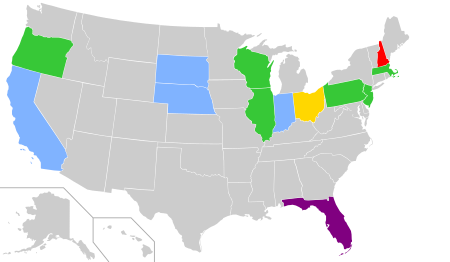Democratic Party presidential primaries, 1968
|
|
|||||||||||||||||||||||||||||||||||||||||||||||
|---|---|---|---|---|---|---|---|---|---|---|---|---|---|---|---|---|---|---|---|---|---|---|---|---|---|---|---|---|---|---|---|---|---|---|---|---|---|---|---|---|---|---|---|---|---|---|---|
|
|||||||||||||||||||||||||||||||||||||||||||||||
|
|||||||||||||||||||||||||||||||||||||||||||||||

Gold denotes a state won by Lyndon B. Johnson. Purple denotes a state won by Robert Kennedy Green denotes a state won by Eugene McCarthy. Blue denotes a state won by George Smathers. Orange denotes a state won by Stephen M. Young. Grey denotes a state that did not hold a primary.
|
|||||||||||||||||||||||||||||||||||||||||||||||
|
|||||||||||||||||||||||||||||||||||||||||||||||
The 1968 Democratic presidential primaries were the selection process by which voters of the Democratic Party chose its nominee for President of the United States in the 1968 U.S. presidential election. Incumbent Vice President Hubert Humphrey was selected as the nominee through a series of primary elections and caucuses culminating in the 1968 Democratic National Convention held from August 26 to August 29, 1968, in Chicago, Illinois.
Though President Lyndon B. Johnson had served during two presidential terms, the 22nd Amendment did not disqualify Johnson from running for another term, because he had only served 14 months following John F. Kennedy's assassination before being sworn in for his 'full' term in January 1965. As a result, it was widely assumed when 1968 began that President Johnson would be a Democratic nominee, and that he would have little trouble in winning the Democratic nomination.
Despite the growing opposition to Johnson's policies in Vietnam in both Congress and in the public, no prominent Democratic politician was prepared to run against a sitting President of his own party. Anti-war activists of the new "Dump Johnson movement" initially approached Senator Robert F. Kennedy of New York, an outspoken critic of Johnson's policies with a large base of support, for a candidacy, but he declined to run. They then appealed to Senator Eugene McCarthy of Minnesota, who was willing to openly challenge Johnson. Running as an anti-war candidate in the New Hampshire primary, McCarthy hoped to pressure the Democrats into publicly opposing the Vietnam War. Trailing badly in national polls and with little chance to influence delegate selection absent primary wins, McCarthy decided to pour most of his resources into New Hampshire, the first state to hold a primary election. He was boosted by thousands of young college students who volunteered throughout the state, who shaved their beards and cut their hair to be "Clean for Gene."
...
Wikipedia





